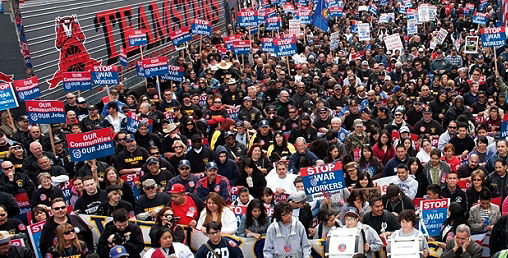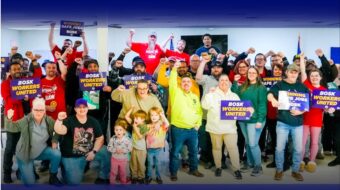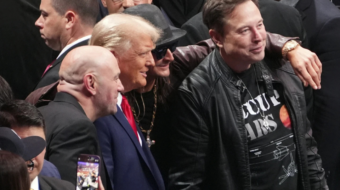
WASHINGTON (PAI) – For the 16th time in the sharply partisan 113th Congress, the radical right GOP majority on the House Education and the Workforce Committee bashed the National Labor Relations Board (NLRB).
That left the defense of the NLRB to panel Democrats and AFL-CIO Assistant General Counsel James Coppess. The GOP refused to ask board members to testify.
The latest attack was a June 24 Education and Workforce subcommittee hearing to pressure the NLRB to drop two ideas it is considering. In the Purple Communications case, the board seeks public comment on to what extent workers can use employers’ email for protected communications – specifically communications about unionizing.
In a prior e-mail use case, involving The Newspaper Guild‘s local at the Eugene (Ore.) Register-Guard, “a divided board ruled the employer had violated” labor law by barring use of work email for “National Labor Relations Act-protected communications but not by other prohibitions,” Coppess told lawmakers.
“But in the end,” federal courts reversed the board, he said. “That outcome left employers and workers uncertain of when email communications on NLRA-protected topics are protected and when they are not.” The NLRB is using Purple Communications to try to say whether workers’ use at home of employers’ email systems – a common practice – for union business and communications follows labor law.
The AFL-CIO says use of email, like use of bulletin boards and regular mail, is legal.
In the other case, the board wants public comments on defining what a “joint employer” is, in cases where the company and a subcontractor both pay workers, who do identical jobs, at the same plant. But the company controls all the working conditions.
The NLRB is using a case involving a Teamsters Local 350 organizing drive among the 240 employees of Leadpoint Business Services – the subcontractor – at the Browning-Ferris plant in Milpitas, Calif., to try to figure out the bounds of being a joint employer. The union represents the other 60 workers whom Browning-Ferris directly employs at the plant. All 300 workers recycle trash.
Given rising employer use of such joint employer/subcontractor arrangements, the NLRB’s decision on whether the workers are organizable is important.
“In petitioning for an NLRB representation election, Local 360 listed both Browning-Ferris and Leadpoint as joint employers. The union did so, because the terms and conditions under which the employees work are, in effect, controlled by both Browning-Ferris and Leadpoint. That circumstance makes it impossible to bargain over all the terms and conditions of employment without both employers at the table,” Coppess explained.
Browning-Ferris, he said, owns the plant and its equipment, sets safety standards, mandates how fast the trash-sorting lines will run, ordering how and how long the sorters will sort the trash, sets their pay and can fire them, too.
“The board has long held two companies can be required to engage in collective bargaining as joint employers where they ‘share, or codetermine, those matters governing the essential terms and conditions of employment,'” Coppess explained.
“Although the bare statement of the NLRB’s long-standing test would seem to clearly require joint-employer bargaining in the circumstances presented by this case, the board’s application of that test over the years has given rise to much confusion – as the regional director’s decision in Browning-Ferris Industries amply demonstrates.”
That NLRB official, Coppess said, recognized Browning-Ferris controlled working conditions in Milpitas, but said it did not have direct control over the Leadpoint workers. The board, Coppess said, is using the Browning-Ferris case to try to sort out that mess, he added.
“Once again, the board would only be doing its duty were it to clarify the collective bargaining rights of employees whose terms and conditions of employment are effectively jointly controlled,” Coppess testified.
Defense of the NLRB irked the GOP-called witnesses – two union-buster lawyers and a lobbyist for the low-wage restaurant industry – as well as subcommittee chairman Rep. Phil Roe, R-Tenn. “Union bosses have increasingly relied on federal agencies to tilt the balance of power in their favor,” Roe, using standard GOP anti-worker anti-union invective, claimed.
“The NLRB is at the center of this effort, promoting a culture of union favoritism that makes it virtually impossible for employers and workers to resist union pressure,” Roe’s rhetoric continued. His comments drew protests from Rep. John Tierney, D-Mass., the panel’s top Democrat.
“The board has not come yet to a decision to change either of these standards,” said Tierney. “It is simply asking for comments.
“According to one witness’ testimony – and I am quoting here – ‘All indications are that what workers and employers should expect is that NLRB will decide these cases by carefully applying established legal principles to the particular facts of each case and that, in so doing, the board will attempt to provide legal guidance to workers and employers who encounter similar situations in the future.’
“Assuming no one associated with this hearing would want to be perceived as attempting to ‘chill’ NLRB members from engaging in their job or attempt to influence a decision under consideration, one must wonder about the timing of this hearing and question its purpose. After 16+ hearings and mark-ups, I think the subject of the NLRB has been covered,” Tierney concluded.
Photo: Teamsters website










